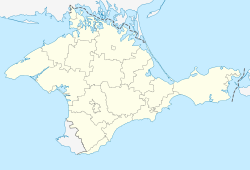Aluşta
|
Alushta Алушта Aluşta |
|||
|---|---|---|---|
| City | |||
 |
|||
|
|||
| Location of Alushta within Crimea | |||
| Coordinates: 44°40′2″N 34°23′52″E / 44.66722°N 34.39778°ECoordinates: 44°40′2″N 34°23′52″E / 44.66722°N 34.39778°E | |||
| Country | Russia/Ukraine | ||
| Republic | Crimea | ||
| Municipality | Alushta Municipality | ||
| Area | |||
| • Total | 6.983 km2 (2.696 sq mi) | ||
| Elevation | 50 m (160 ft) | ||
| Population | |||
| • Total | 29,078 | ||
| • Density | 4,264.78/km2 (11,045.7/sq mi) | ||
| Time zone | MSK (UTC+3) | ||
| Postal code | 98500 — 98519 | ||
| Area code(s) | +7-36560 | ||
| Former name | Aluston ('till the 15th century) | ||
| Climate | Cfa | ||
| Website | http://www.alushta.crimea.ua/ | ||
Alushta (Ukrainian and Russian: Алу́шта; Crimean Tatar: Aluşta; Greek: Ἄλουστον) is a city of regional significance on the southern coast of the Crimean peninsula, claimed by Ukraine as part of the Autonomous Republic of Crimea but administered by Russia as the Republic of Crimea since 2014. It serves as the administrative center of Alushta Municipality, one of the regions Crimea is divided into. Founded in the 6th century AD by Emperor Justinian, today it is a resort town. It is situated at the Black Sea beach line on the road from Hurzuf to Sudak, as well as on the Crimean Trolleybus line. Population: 29,078 (2014 Census).
The area is notable for its arid, rocky terrain due to its proximity to Crimean mountains. During Byzantine times the town was called Alouston (Ἄλουστον) meaning "Unwashed". Vestiges survive of a Byzantine defensive tower from a fortress of which the city name has derived, as well as a 15th-century Genoese fortress . During the Genoese rule the name modified to Lusta. Adam Mickiewicz dedicated two of his Crimean Sonnets to Alushta.
...
Wikipedia



